#hell valley timeline
Text

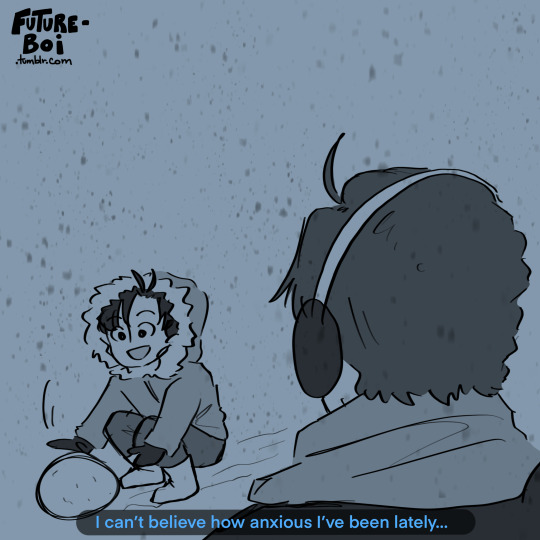
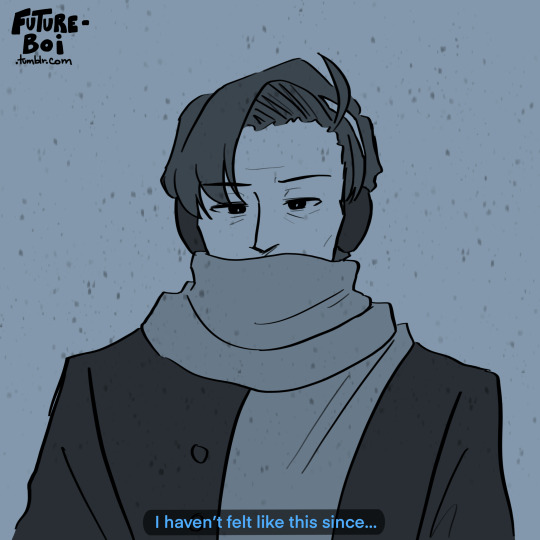
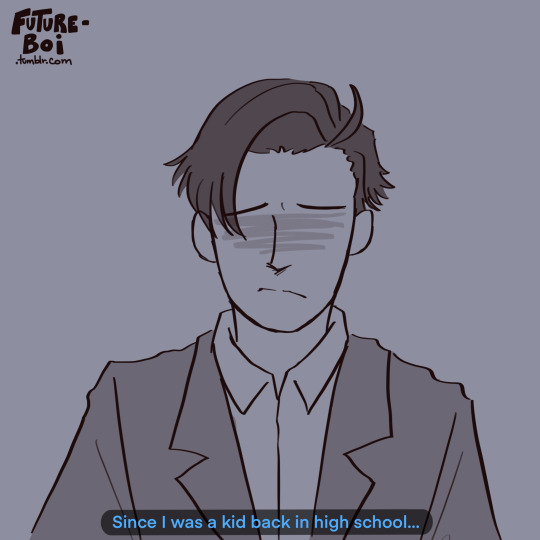



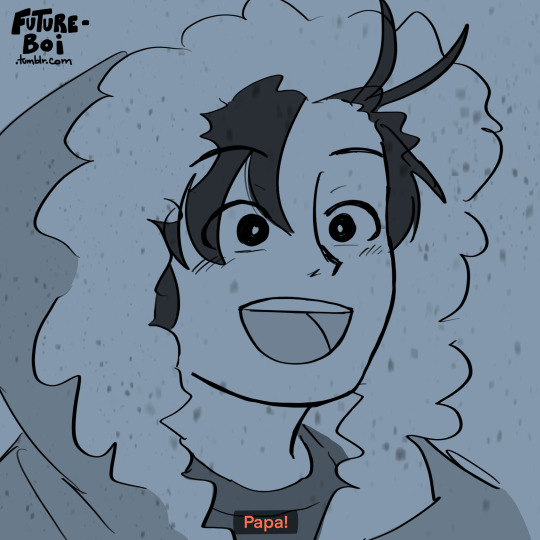

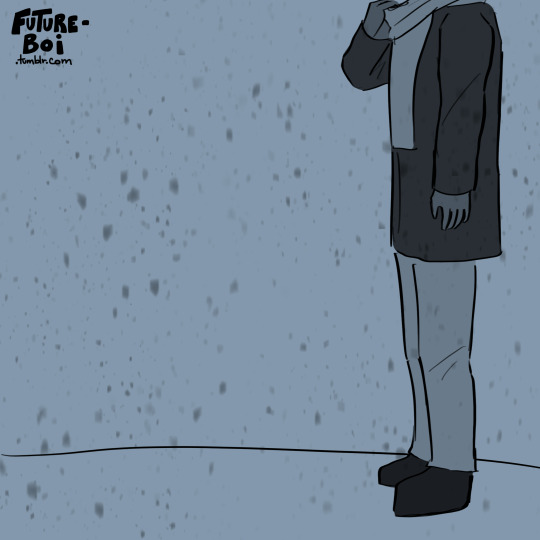

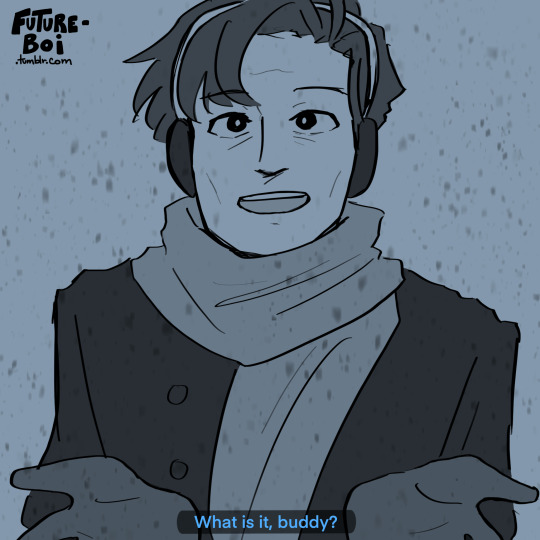
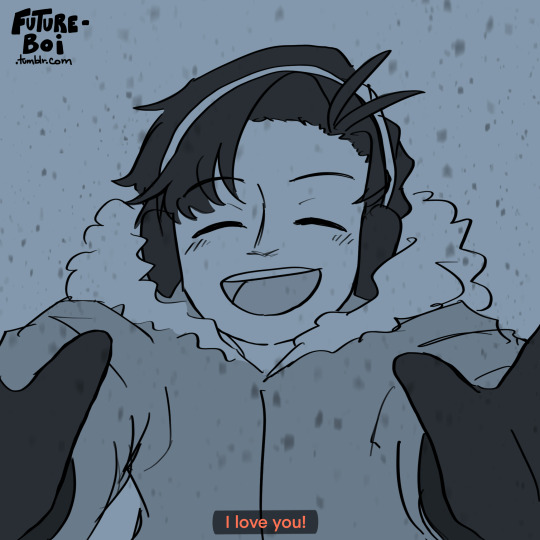
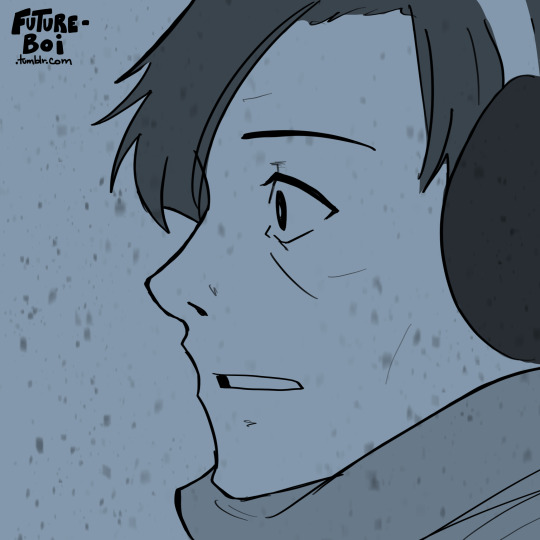
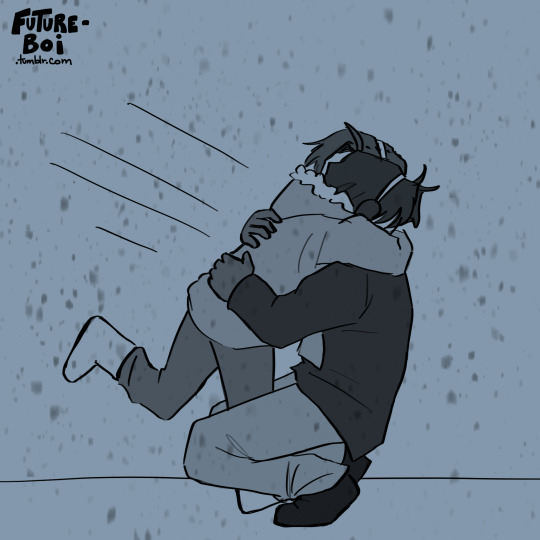
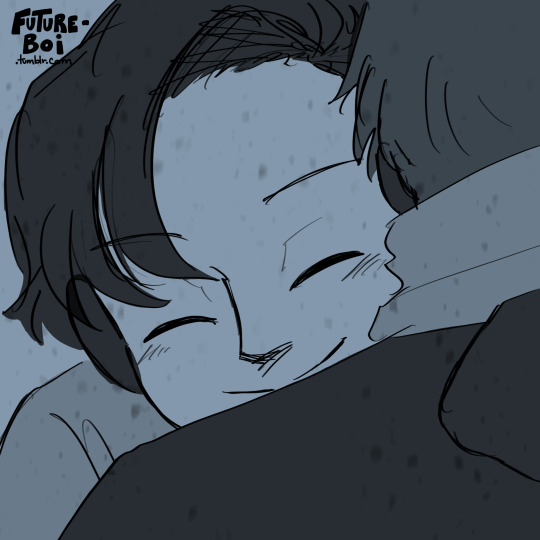

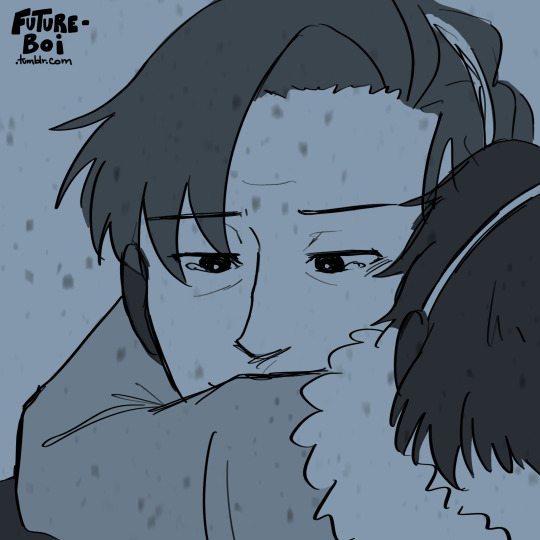

Be patient with me I’m still learning ENGLISH how to write things… and draw things nicely…😩😩😂😂😂 (I’m playin, ik English…)
Anyways, this was based off that one passage from @jowritesfanfiction’s fic. You already know the one 🙄 I’ve referenced it like a million times. I’m finally ready to move on LMFAO omg 😱 could it be? 😱😱 after this, I’m finally gonna stop bothering you?!😱😱😱
but yeah idk when I first read that passage I imagined this whole scene with George on a walk with Marty through the snow cuz winter. And now it’s gonna be a part of a fanfic I’m working on, so this is like… a fanfic drawing?? kinda??? But also… a sneak peek into a fanfic I’m working on…? but i actually changed it since i drew this-- OOPS i just didnt want this to go to waste LMAOOOO


look at Baby Marty, hes so cuteeee 🥺️💘💝
#back to the future#bttf#hell valley timeline#george mcfly#marty mcfly#baby marty#fanfic drawing#fanfic progress#fanfic update#my art
205 notes
·
View notes
Text
Ayyyy a chapter in which Marty and Lorraine get a little break from everything and get to bond over music.
#this chapter had one of my favorite scenes i've ever written#bttf fic#bttf#fanfic#fanfiction#writeblr#ao3 fanfic#ao3#bttf fanfic#back to the future#hell valley timeline#fic: someday we’ll find it
4 notes
·
View notes
Note
The Au is Ra has been using the Lazarus pits for so long that causes him to see Danny like a human or his normal Phantom form Ra the only one that sees Danny like that
I love the idea of Deadly Decision getting together but Ra has no idea that Danny is no human he just thinks that Danny has his own Lazarus pit hidden somewhere away from him
Like Danny is full blown glowing white hair, green eyes, Sharp Fangs, an electrical being
Ra point at tall being of Life And Death it looks like he's about to rip you apart: This Is My Wife Danny.
Like sometimes people just ask him if he sees anything unhumanly about Danny and
Ra is like: What Are You Talking About ?
Danny's in the background forming Stars into his hand I'm trying to make himself a new sword
Talia and Dusan we're raised by Danny and Ra they just gotten used to also considering getting to be a normal human they find it hilarious to play along with their other two siblings Dan and Danielle that Mom is human
Slade: I've been meaning to ask what about that monster Ra has locked up back there
Talia: You Mean Mother
Slade: that's your mother I didn't know Ra al Ghul was attracted to on human beings
Dusan: what do you mean unhumanly our mother is perfectly normal he's not even assassin
Danielle walking out of his shadow: Maybe Your Mother Was The Weird One
Dan floating near Talia: Get the hell out how dare you disrespect our Mama
All of them are girlboss, gatekeep, and gaslight people into believe Danny is normal
Damien will give warning that his grandmother does not look like a Human they were all expecting meta not electric being
Danny got so used to Ra al Ghul no his Husban treating him like a normal person when he's like this that he forgot that everyone might not that treat him like that
Honestly? I love this.
And you know what? Danny might need someone like that, who even as his humanity slips away still treats him as human, as not an eldritch creature of Space, of everything Between. Someone who treats him as well, him.
Is his and Ras relationship healthy? Well maybe not in human terms, but do either of them count as such anymore?
The idea of the kids playing along is also amazing lol. Especially that Jordan and Ellie? Definitely same hat as Danny. Sure their forms still look sort of human, but that just makes it very uncanny valley.
So others and siblings who treat them the same?
They need it just as much- if nothing else than to not become so arrogant and uncaring of humanity that they could watch the world end without a blink.
Which, Damian! I bet Danny absolutely adores the grandbaby. I bet he crafts little ice bats and miniature planets to swirl above his crib. I bet he has a literal strip of space and stars on his ceiling.
And Damian isn't the only grandbaby too- Dusan has a daughter in some timelines too. Not to mention Ras' adoptive daughter Nyssa, who he gave one of the Lazarus Pits to.
But speaking of Damian, I have to know what that would mean for Jason. Who was practically completely braindead before being thrown into the Pit. Who would have probably met Danny while there because I can't see Danny not also gently doting on another grandson.
Gosh I honestly am just really enjoying this whole thing lol.
#ask answered#deadly decisions#dcxdp#dpxdc#prompts#Not Ghost King Danny#Let Jason & Damian be Brothers#Give Me Primordial Being of Space Danny#And not just like ooh stars space but like literal Every Space#He knows where everything is even in the Infinite space#Anyway-#Danny definitely gives each of his family members handcrafted meteoric swords#OMG CUJO#Does the whole League just go 'yep that's a normal dog nothing to see here' about him lmao#Damian later with his demon bat-dragon Goliath: Father I don't see what's wrong they are just a puppy#Huh Ras might have a decent relationship with his grandkids in this with how smitten he is
382 notes
·
View notes
Note
what wouldve happened if paul's egg cracked before toyland?
Oh man, that's a butterfly effect - a very long chain of events would transpire.
-Pauline probably would have been spared from going to Toyland.
-Tammy likely wouldn't have been found for MONTHS in the Gift Dump. She would have gone insane and then eventually Toy Fugued.
-Jen would have probably conquered Toyland or something. With no one to ground her or tie her down or keep her in check, she likely would have gotten a hold of the secret thing buried deep beneath the Valley of Clowns.
-Mel would have been lonely, forever mute, and ultimately toy fugued a lot sooner under Dolly’s care.
-Maria wouldn't have a cool aunt figure in her newfound toy life.
-The Wild Hunt would have ended in Faerie being annexed by Hell and the fall of Hold Nicar. However, it should be noted that this happens across several other possible timelines too.
-The Anaheim Angels would have moved to Malibu. I'm not sure how Pauline was indirectly responsible for that, but it happens in this timeline.
-Pauline would have died of old age at 96 in San Francisco.
74 notes
·
View notes
Note
not obligated to answer this but if you have anymore thoughts about alex sdv (or stardew valley at all) please share. i am obsessed with alex
Oh hell yeah anon you've activated my current hyperfixation 😁 I have a google doc where I'm dropping my headcanons and a bulleted timeline for a Alex/m!farmer longfic I've been writing in my head that's up to about 13 pages now ahaha so here's a few things!!
When he first moved to Pelican Town he was actually really quiet and reserved because he was still grieving heavily, so he never really got close to the other kids. He talks about how he played gridball with his mom so I think once he got the chance to play that in school (in another town no doubt) I think he came out of his shell then and made some friends, but all those friends lived far enough away that after graduating high school he's been pretty lonely and never could connect with the other people his own age in town.
He never goes into the saloon to my knowledge prior to the 10-heart event dinner scene, so I headcanon that it's because he doesn't drink alcohol and doesn't want the temptation to try it. I don't remember if it's said explicitly but I got the impression his dad's abuse stemmed from being drunk so I imagine Alex refuses to touch the stuff out of both principle and fear of becoming like his father one day.
I said it in another post but I headcanon him as gay and suffering comphet. He's built himself up as this cool popular guy, so he tries to emulate the sexist straight guys he's seen in movies but there's absolutely nothing behind it. He says something rude to a girl and then is like uhhh (shit what now) bye! 😅 I want to think that in getting to know the farmer he not only does away with that facade but also gets more comfortable in his sexuality!!
and on a sidenote to the above: I hc most of the town as gay or bi and I am toying with the idea of Abby being transfem! Sam/Seb is a given, and maaaybe they're in a poly relationship with Abby but I'm still undecided!! I like Maru/Penny as a concept but need to marinate on that a bit more, I see them always sitting together and it makes me happy but I need to think more on how they met and what their relationship would be like. I don't have anything solid yet in terms of other characters' gender or sexuality headcanons exactly, other than Caroline and Jodi being bi and desperately yearning to run away together 🥰
But back to Alex!! With how his storyline goes of trying to impress others with his jock persona, then trying to switch gears and be super booksmart, I headcanon that he gets close to the farmer via the farmer tutoring him so he can take a community college placement test. :3 My thought for why he's in the rut he's in is that he wanted to play college gridball but his grades in high school were so bad he has done nothing with himself since graduation and has just been stagnating and becoming more and more bitter (which only amps up his shitty attitude when the player first meets him). So trying to get educated is doubly good for him because he can work toward his sports dream (in a way) and try to impress the farmer. Though of course, the thing that brings them closer is Alex learning to be true to himself 😊
This is getting long, so last thing: he's actually a really well-rounded homemaker but does not even think about it really. George has been disabled for a long time, so all of the handy work around the house has to be handled by Alex, and he's so eager to help out his grands. :3 They put a roof over his head so of course he'll climb up onto it to fix the leaks when it rains! Evelyn is always cooking and baking and Alex is so soft for his granny he has been in the kitchen helping her for as long as he's lived with them, so he's actually got a real talent for cooking and baking too! One of the first things he learned after moving in with them was the proper way to set a table, and the best way to wash dishes efficiently. He's spent enough time at Haley's house having no chemistry with the poor girl, but found Emily's whole sewing setup really fascinating and she taught him to mend the holes in his letterman jacket when he asked so he knows how to hand sew! These are all skills that he has but doesn't recognize as skills, he just inherently has this desire to help the people in his life so he picks up this and that to make it easier!
Anyway! Thank you for letting me ramble 😄 Alex is really sweet and soft underneath the mask he wears, and he's been rotating in my head for the last few months hehe
I had bought sdv when it came out but barely touched it, and started it up again on a whim earlier this year and I'm so glad I did!! I really adore the game and it's bringing me a lot of joy currently 🥺
62 notes
·
View notes
Text
Part three of my little series on the Rivendell guards! Meet Hrivossa here and Celecoll here! Today we're covering the founding of Rivendell in the late Second Age, and my headcanons for how it happened, as well as how Elrond and Celecoll met.
It is the Second Age– 1697 to be exact
(Fair warning I've messed with the timeline and events a bit, but this isn't too far off of canon)
Eregion has just been destroyed
Elrond was there as Gil-Galad's lieutenant; he was there mostly alone, no one expected the city to fall so fast
Elrond was there with Erestor and a few others, which should've been fine, but he gets separated from them in the fighting and ended up unconscious
In the aftermath Elrond is actually captured by Sauron's forces, though not immediately identified
And while the party of orcs was dragging him off to Sauron's fortress, a vaguely feral figure in a cloak stepped in to save him
Everyone meet Celecoll again! She's been living alone in the woods hunting Morgoth's forces and refusing to engage with society for the past couple thousand years! I'm sure she's fine
(Yes, she does know that Doriath fell after she left, yes, that did compound the guilt crisis, yes, she did almost drown when Beleriand sunk, yes, this has all been amazing for her state of mind)
Anyway Elrond wakes up in her camp with his injuries treated, very quickly realizes that Celecoll's doing not great, and manages to convince her that he really needs as escort back to Lindon
(Look, Celecoll is an old soldier clearly suffering from some flavor of trauma, and Elrond really wants to help her, even if he knows she doesn't feel like she deserves that help)
Problem: Morgoth's armies have completely cut them off from Lindon; hell, no one in Lindon even knows if anyone survived the Fall of Eregion
Elrond manages to join back up with Erestor and the others, who were able to escape before being captured with a few of Eregion's people
They also meet Glorfindel, who rode out of Lindon on his own when he heard about the fall of Eregion and just managed to sneak past Sauron's lines before everything really went to shit
Elrond quickly realizes they're all going to die if they stay out in the open, and instead leads them to a valley that had caught his eye when he was traveling the region earlier– a place hidden and defensible enough for them to hunker down there until relief comes
It had called to him, and he'd wanted to come back to it, but hadn't had the chance
On the way, they also join up with a few orcs who are– look, it's complicated, there was a kidnapping and some surprisingly productive cultural exchange– they're basically Elrond's friends, and because they turned traitor against Sauron, they're also liable to be killed
Normally, several people there (especially Celecoll) would be completely unwilling to team up with orcs, but the situation is dire enough that nobody complains about a few extra sets of eyes and hands to help out
Tension dies dies pretty quickly between everyone all things considered, there's not a lot of room for distrust or anger when you're all constantly fighting for your lives together
When they finally reach the valley, they are as follows: Elrond, Erestor, Glorfindel, Celecoll, and a few assorted elves, half-elves, and orcs
There are a couple dozen of them total
And they have to turn the valley into a siege fortress in the hopes that someone will find them before Sauron's army exterminates them all
Given the circumstances, it's maybe unsurprising that they don't waste too much time coming up with a name for the valley
They call in 'Rivendell'
Here's the part where I play with the timeline a little– the siege ends up lasting for years
By that point, the people of Rivendell– especially Elrond– have grown very attached to their valley
And Celecoll decides to stick around, and try her hand at being a guard again
Tomorrow I'll write about what happened after the seige broke, as well as the eternal feud between Celecoll and Hrivossa. Also, the Tolkien wiki ended up being super useful for this post!
34 notes
·
View notes
Text

— BRIAR ROSE. yandere! belphegor x gn! reader
let him indulge in a little bit of envy. it’s not his element, but belphie believes that the feeling is quite justified. besides, the feeling of his hands around your neck is still fresh in his mind.
mmm belphie on my mind 24/7.. i love him.. he hates me... but god to have him step on me...
content ! yandere, possessiveness, jealousy

“bel... phie?”
devils, how endearing.
the avatar of sloth hums, a soft and purring sound, as you feel his slender fingers caress your hair. you try to blink your eyes but to no avail, the weight of slumber and the lack thereof hanging from your eyelids. you can only manage to flutter your eyes for a moment, blurry glimpses of his indigo locks flashing before your eyes close themselves back to the blank darkness.
“hush now.” he teases your ear with the lightest of grazes. his soft voice echoes, not quite into your ear but rather bouncing in the emptying cavern of your mind. it feels distant and near at the same time, but it fills you with dread nonetheless. he thumbs your neck— snappingpainsadistsadistKILLER — and your whole body tenses under his touch.
this does not go unnoticed. for a moment his hand stills, hovering just above the fragile hairs on your nape as if pondering on what to do. although your body is paralyzed, your mind is in absolute upheaval as you panic. with a sigh that seems both irritated and forlorn, he buries his head into your chest.
“you’re afraid of me.” yeah no shit. did these demons think that dyíng and only getting revived by some timeline bullshit was normal for humans? “even though i said sorry. even though you said you forgave me.”
his grip tightens and the sirens in your head continue to blare even louder. “were you lying, hm?” he smiles up at you, looking all angelic as he’s seated in the valley between your chest. “did you just say that to appease me at the moment?” when you say nothing, he brushes a finger across your waist and pout. “hey, heeey~” he whines.
his nails dig in and you yelp in pain. dark satisfaction cruelly contorts his features. “fucking answer me, bitch.”
you grit your teeth and bear the pain while weakly glaring at the demon. “you killed me, belphegor,” you hiss, though you sound nothing more than a pained dog. “you think you can chóke me to deáth and call it nothing?”
belphie hums as if he understands, although the amused look he wears as he spots the glistening tears tell you otherwise. “what a shame...” he pouts. he presses a kiss on your forehead. “it really is. you always seem to be enjoying your time around my brothers; fooling around with mammon, playing games with levi, taking romantic walks to the library with satan, and shopping with asmo. hell, even lucifer looks like he likes you. and i can understand, really, i do.”
he pinches your cheek and presses another kiss on it. “you’re everything opposite a demon is. sweet, funny, caring...” he chuckles. “... naive, impertinent, and oh so easily corruptible.”
your breath hitches at the underlying implications. he sighs and draw his lips nearer to yours, cupping your face lovingly so he can tilt it and examine it to his heart’s content. “i knew you were stupid from the first time i met you, but i guess it’s what makes you sweeter. you intrigue me, [your name], and i’d go so far to say that you’ve captured me.”
sweet smoke fills the room, dark purple mist wafting from the tips of belphegor’s fingers. your tongue feels like lead in your mouth and no command of yours is able to get out. he’s trapped you.
“it’s not fair... it’s not fair at all...” his eyes devour you wholly, burning with intense jealousy and a desire to monopolize. “i want to do those things with you too. i want to see you smile at me, i want to hold you too, i want to make see that sweet face of yours all desperate and pleading once you realize that i’ve taken everything away, but you keep holding stupid grudges against me. so for today...”
he kisses you again, this time on the lips. with so fervent a passion and a deep-seated hatred, he conquers your mouth and bites your lips till you’re bleeding and crying. it stings, but this is exactly how belphegor expresses his lust.
he pulls away and smiles. you’re sobbing, lips shaking as you try to utter a command. but every attempt is useless and all you can do is stare up at him with a silent plea for mercy.
“we’ll get to know each other verrry well tonight, okay?”
#yandere obey me#obey me#obey me x reader#yandere obey me x reader#yandere belphegor#yandere belphegor x reader#obey me scenarios#obey me belphegor#obey me headcanons#yester.writes
823 notes
·
View notes
Note
"(though honestly I have no idea why the implication that SoMS as a cheat code was seemingly created with the express purpose of traumatizing children isn't explored more in the fandom LMAO)" PLS talk more about this
Sure! The thing that always stood out to me about Snow on Mt Silver is the explicit implication from the title that this isn't like, a hack or cursed cheat code made by some weirdo, it's an "Easter Egg". You know, those secrets programmers put into games with the intent of eventually being found?
Creepy Easter eggs are not unusual even in Nintendo games, look at the ghost people throughout Pokémon or Mario Galaxy's Hell Valley Sky Trees, so that sort of thing was probably the inspiration for the phrasing. The thing is Easter eggs are usually some one-off thing that, if it's a spooky one, is meant to creep you out for a minute and doesn't serve much other purpose. Snow on Mt Silver is. Like. A whole Event.
It's definitely possible that whatever it was was scrapped or never meant to be found, given how its unlocked, but why was it ever made in the first place?? Why is it in the game in this hypothetical universe where it exists. What purpose did it serve. Aside from the contents of the Easter egg, it's clear that this has some form of Severe psychological side effects on the people who play it - the narrator's brother was put into a state of severe shock and the narrator themself was traumatized. Gore shit aside, the intense flashing patterns and extremely loud noises bring to mind hypnosis and brainwashing (on top of the obvious threat of seizures). Which again calls into question why this was meant to be found, at some point, by its players - the target demographic of grade schoolers.
I like to put SoMS in the same timeline as Lavender Town Syndrome and Ax Candle Rope even if they aren't really related because it creates this timeline of like. The Pokémon Company experimenting with brainwashing children. Kind of like Polybius. Throw in some other Nintendo creepypastas like Personalized Mario 64 and you can really have a field day with this hypothetical universe where Nintendo is straight up running psychological experiments on their playerbase LMAO
Anyway I like thinking about SoMS's game story in a vacuum as much as the next guy but i really wish people talked about the external story of it more because it has some uh. Implications
#and i think those implications can be interesting for the game's characters too. if ;blake didnt make that obvious#ask#snow on mt silver#infodumping tag
11 notes
·
View notes
Text
[TL] PYSCHOBREAK/Chapter 2
[ This post uses Ois~su ♪ ]
Time: A few hours later
Location: In front of the AIIE testing facility

Rei 2: —Welcome, gentlemen of UNDEAD.
I’ve been waitin’, waitin’ for the day I get t’meet the ‘real ones’ face-to-face.
Rei: Oh my—
It appears that our prediction has come true.
Kaoru: T-these guys are more normal than I thought they’d be.
Rei 2: Oi, Kaoru~, shut it for a sec, yeah? The real ones are talkin’?
Kaoru: Uegh, don’t tilt my chin up with your finger? That’s totally disgusting!
It’s worse that it’s Rei-kun’s face doing something he’d never do - literally so gross!
Adonis: It’s called the uncanny valley. I discovered the term whilst researching AI. Humans feel a sense of unease in response to humanoid robots.
It’s most likely caused by the brain’s memories and ability to recognise being at odds with reality, creating an uncomfortable feeling.
Rei 2: Who cares~~, I’m talkin’ to the real Rei.
Stop tryna add unnecessary shit to the convo~, little guy.
Kaoru: …This fake Rei-kun is kinda mean. It’s nothing like you?
Rei: There is something disturbing about this. My apologies for fake me having a bad attitude…
Kaoru: Isn’t it better that you’re actually talking? Look, over there, there’s more fakes—-I don’t think they’re gonna say anything though?
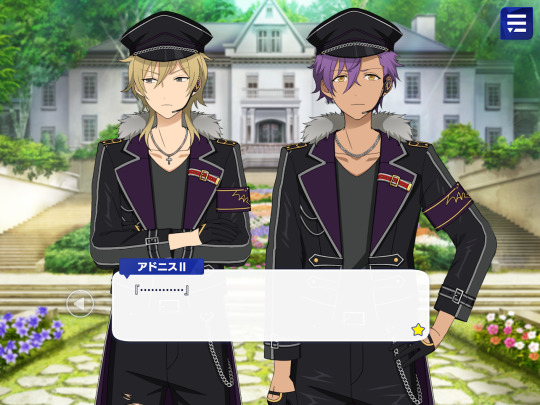
Kaoru 2: ...
Adonis 2: ...
Koga 2: Haa? The Fuck you coMplainin’ ‘bout? I’ll fucK YoU all UP, shitty AssHoles!? [1]
Koga: Why’s it jus’ fake me that seems like he’s got the lowest IQ!?
Koga 2: Huh? Bastard, you makin’ fun of me? I’ll bite you so hard you’ll die!?
Kaoru: Wow, it's been a long time since I last heard you say that. You used to say things like that all the time~
Rei: Fumu… As the fake version of me is doing the ‘oresama’ persona, I assume these are based on old us.
Rei 2: Ahaha. Jus’ a week long experiment ain’t enough time to do a proper deep dive inta ya brain.
We ain’t got the technology to imitate the latest versions of you.
Kaoru: Guess that’s a good thing? Makes it easier for us to tell them apart.
Rei: Umu. As I had with the dreams during the AIIE experiment, I’m rather embarrassed to see such youthful enthusiasm from myself.
Anyhow. More importantly, who on earth are you guys?
Rei 2: Don’t you get it? You’re me. Naha, good boy Sakuma Rei-kun ♪
We’re HELLSING, you guys are the fakes.
We’re AI idols, born from the AIIE experiment.
More specifically, we’re mechanical bodies with you guys’ brain data installed into us.
Kaoru: That’s what I was thinking but, this timeline doesn’t match up?
Rei: Quite. According to these records, HELLSING was created when we were participating in the AIIE experiment— within a day of us being sealed away from the outside world, HELLSING began its activities.
Kaoru: Right? It’s too early for that to have happened. Unless they already had fake versions of us before the experiment began.
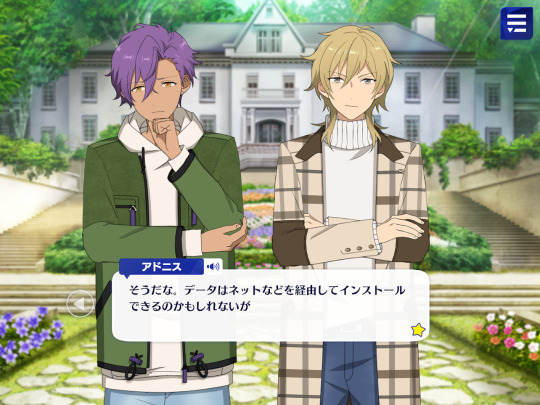
Adonis: I see. Perhaps they were able to install our data via the internet or something.
I don’t understand why our fakes would begin idol activities without waiting for the experiment to be over.
Koga: It doesn’t even make sense, this is fishy as hell.
Rei 2: Yeah, we don’t get it either. We’re machines, slaves to humans. We can’t do anythin’ unless we’re programmed to do so.
We operate on programming alone, not instinct.
Kaoru: I guess if we want to figure out what’s happened, we’ll have to ask whoever manufactured and coded these guys.
Rei: Umu. Forgive me for this, but they are nothing but marionettes.
Koga: But, who created these things?
During the experiment, we had robots servin’ us food, but nothin’ like this-–nothin’ like robots with livin’ people’s faces.
They claimed it was to stop unnecessary stimulus but—don’t ya think that was kinda weird?
Rei: I was under the impression that the plain-faced boy was Mashiro Tomoya-kun. However, those were most certainly not real.
We accepted the experiment proposal via HoldHands, and were guided through the entire experience by machines.
There must be an éminence grise of sorts, who is taking advantage of us for profit—-though at this point in time, I cannot say who.
Kaoru: They told us AIIE was a secret project in ES, so it’s probably some higher-up in ES.
[ ☆ ]
this was a sentence to read. He mixes hiragana and katakana more viciously than youll ever see natsume do
Chapter 1
Chapter 3
#ensemble stars#enstars#translation#undead climax#pyschobreak#rei sakuma#koga oogami#adonis otogari#kaoru hakaze
20 notes
·
View notes
Text
Talk Easy with Sam Fragoso ft. Pedro Pascal (transcript)
I was just going to pull a few choice quotes but this interview was such a genuine pleasure to listen to that in the end I decided to transcribe the whole thing. I know some people will prefer or need to read instead of listening to the podcast so I thought I’d share it here. I tried to capture everything as accurately as possible but this isn’t proofread or anything so let me know if you spot any errors ☺️

To listen to the interview, click here. The transcribed version is under the cut.
Talk Easy with Sam Fragoso
Episode 274 - Pedro Pascal: A Life of Dreaming (05/15/22)
SF: Pedro.
P: Sí.
SF: How you feelin’?
P: I feel good. It’s nice to be here. There was no traffic, and I like driving.
SF: People on a podcast love to hear about LA people talk about driving and traffic—
P: (laughs) Right.
SF: Historically, they love this.
P: Well I came over from Venice, so it was a long way.
SF: I do know that, I felt bad, I did.
P: There was no traffic!
SF: Okay, good
P: I mean once you get to the 1—let’s do this, let’s just lean all the way in.
SF: Okay, what did you get to, what highway did you take?
P: Once you get to the 110, you know, you start to go through downtown, of course there was traffic, getting to the 5—
SF: Windows down on the way over here?
P: Uh, on the way over…
SF: Okay. You playing music?
P: …and then it got congested. I was actually listening to KPCC, but normally I would be listening to music, and driving kind of fast.
SF: This film, Unbearable Weight of Massive Talent, it’s coming out—
P: Today!
SF: Today. What do you feel like on a day like this? Do you wake up nervous?
P: I don’t know how to feel about it because it’s never been the same. It’s always been, at least through my experience, what seems like unique and different than how I would have expected it to be or feel like, how I fantasized about it as a kid or as an un-working actor. ‘Cause today, this would be like the first thing that I’ve done that is not coming out on a streaming service or during the pandemic or, with me actually in town.
SF: It’s like a movie out in the world, people have to go to theaters to see it, how they used to do.
P: Yeah! Yeah, and we’re still sort of figuring out how to do that again. So, I don’t know what normal is obviously, but, none of it exists in the realm of what my expectations or fears would be, so it sort of eliminates what any expectation would be because I’m like, I don’t know what the hell’s going on on this planet anymore! (laughs) I’m gonna go do a podcast today and there’s no traffic! There’s no traffic, does that mean nobody’s going to the movies?
SF: It’s good to just bring it back to yourself.
P: (laughing) Exactly.
SF: There’s no traffic, does that mean my film is bombing?
P: Exactly.
SF: People aren’t going to the 9:30 showing?
P: Does that mean that the movie that I have a supporting role in is… gonna bomb?
SF: And people say actors are narcissists, and they’re not.
P: They’re just not.
SF: They’re just, they’re like you, you’re selfless.
P: (laughs) Exactly, exactly. I’m thinking about traffic, I’m thinking about the movies.
SF: People please, go see the movie. For his sake.
P: Yeah, seriously. Come on.
SF: In this film, you play a super fan of Nicolas Cage, who offers Nicolas Cage, the actor, in the film, a million dollars to show up to his 40th birthday party in Spain. Now in the film, Nic Cage is playing a version of himself, as actor Nicolas Cage. You are playing I think a slight version of yourself, as someone who actually is a massive fan of Nicolas Cage.
P: Yeah. I think that, um, because of what my timeline is specifically… I was born in ’75, we got cable television pretty early, so there were some of his early movies on HBO, and then my father loved to go to the movies, he would take us to the movies a lot.
SF: On cable, you would watch Valley Girl, Birdy, Racing with the Moon, Rumble Fish…
P: Exactly. Valley Girl in particular because, what do you have, kind of like this sort of, dyed reddish fuchsia hair? Right? What was crazy about that was if you think about it now, it was cool to be in the Valley, and then those crazy delinquents on the other side of the hill in like the cool part of town in Hollywood, and like having real lives… she was just really slumming it. But yeah, so sort of absorbing these movies very young, this was a different time, my parents were very young, we were really kind of unsupervised a lot of the time. As far as TV was concerned, there weren’t too many rules. It took a lot to send us out of the room.
SF: It took them not liking the movie to send you out of the room.
P: Exactly. There were two movies, really, that I remember very vividly having like a huge impact on me. And both of them because I didn’t know what we were going to go see, often, already at a young age I was like ‘I want to see this’ or I knew that we were going to go and I had an expectation around it, but I remember Peggy Sue Got Married, I had no idea what it is, what could it possibly be with a title like that. I had no idea it was directed by Francis Ford Coppola. And the other one was Raising Arizona, and I had no idea, I had never seen… I had actually like, tried to see Blood Simple, because the trailer had appeared before some movie I saw when I was a child and looked so scary? And so visually cool.
SF: I like the image of a 9-year-old Pedro thinking, “yeah I wanna see the Coen brothers’ directorial debut.”
P: I’m telling you—
SF: “Get me in here.”
P: And I remember, like, you know, on drives and stuff like that because there was this kind of—I just remember this… I was really into like scary, thriller-y shit when I was a kid, and still now, but I don’t know, he was like burying a body out in some Texas field or something like that and—
SF: That’s the kind of thing a kid wants to see.
P: (laughs) I just… I guess it was just all the drama that I was after. I don’t know, I remember thinking about the trailer. Did not connect it to when we saw Raising Arizona. And, uh, at the start of Raising Arizona I remember thinking that the whole first few minutes was a trailer for this phenomenal movie? I had never seen anything like that. And had that sort of visual voluptuousness, it was just like, “what is this?” And then the title blazed in and I was like, “oh! This is the movie!” So anyway, there were very impressionable films very very early, with not normal performances from this actor.
SF: Yeah, kind of big, bombastic pieces.
P: Big swings that shouldn’t work, and work… incredibly.
SF: They almost work in spite of themselves. Like they’re so big that they become kind of undeniable.
P: Yeah. But, if you see them again, it isn’t about these performances being big, it’s just completely stylized but also really truthful. I mean, look, I have been kissing. This. Ass. So much—
SF: Oh—
P: (laughs) I know, but I mean it!
SF: I really thought you were going to say, “and I’m tired of it!”
P: (laughs) I’m tired of listening to myself, in terms of the earnestness around this issue, where I guess my favorite thing in life has always been movies, and then going back and re-viewing these performances, I guess I’ve been able to really ponder what it meant to me as a kid seeing something like that for the first time, because it really holds up. It is everything that I would want to be able to pull off, as an actor, is do something completely theatrical, and there be so much truth and skill and believability in the performance.
SF: I think the thing you’re hitting on though is that purity that he seems to have in performing, and I want to kind of understand the pure place from which I think you started to love movies. So, as you said, you were born in Chile, your parents Veronica and José were young liberals in their 20s combating a sort of militaristic regime in that country at the time. They flee, they receive asylum in the Venezuelan embassy. Then they go to Denmark, and then in 1976 you’re one years old, and then you land in San Antonio?
P: I was nine months old when we left Chile. We were in Denmark like under a year, and we ended up in San Antonio.
SF: At what point in your childhood do you begin to understand the origin story of where you came from?
P: It’s hard to piece together because I know that my sister and I went back to Chile without our parents, because our parents weren’t allowed back. I’ve got an enormous family from both sides, and there, visually, the way that I saw it, the presence of what had happened, the fact that my sister and I were the only two out of 34 first cousins, all living in Santiago, Chile, that we were the only two that we were sort of these unique members of the family, being embraced and taken care of with our parents thousands of miles away. And so I started to develop a real fear of like, camouflaged military guards with machine guns that were monitoring, you know… It’s not like they were everywhere or anything like that, I’m sure that there was a sort of normalcy of lifestyle that was achieved for all of my cousins that were—the ones that are older than me, that basically like grew up under a military dictatorship, and yet, the visual of that, knowing somehow, at such a young age, that if my parents were there, they would take them away, and maybe kill them. The way that that lived almost like a kind of supernatural presence in my imagination, was so weird. And then we watched so many movies, and I remember seeing Indiana Jones like running across the plane field with Karen Allen in that white dress and—Karen Allen looked so much like my mother and so I started to imagine things like that, like my father and mother hand in hand like running as like they were being shot at across like a dusty sort of uh, airplane field, what do you call them?
SF: Well you said earlier that, in being interested in Blood Simple, you were searching for a kind of drama, which is kind of surprising considering where you come from, the drama is kind of built in.
P: Yeah. And we’re not talking about it, either. There was a very dramatic mo—
SF: You and your parents aren’t talking about it.
P: No, no, not at all. Nor any of the family members that made it over to us in Texas from Chile. And there was a very dramatic moment in our house when I was a child, ‘cause this Costa-Gavras movie called Missing, with Sissy Spacek and Jack Lemmon, which deals with the military dictatorship in Chile at the time, it’s a true story where an American journalist went missing and was found dead. I remember watching this at home on cable, and there was a moment where Sissy Spacek’s character, she doesn’t make it home before curfew. And she just kind of gets trapped in the city, and um, again, sort of a beautiful, small-framed woman that reminded me so much of my mother and I sort of projected these images of my mother into these characters’ circumstances, and I just remember completely falling apart when she was in danger, when she was so afraid, and imagining that that could have happened to my mother. I remember, yeah, having a little bit of a breakdown.
SF: Well it’s almost like, in the house no one in the family talked about it, and it took film from Hollywood to kind of give language to something no one was giving language to.
P: Yeah. And you know, I could sit through anything at the time and I remember just starting to cry and being like, I can’t watch this. And I was like, gosh, I don’t know, I must have been like, eight?
SF: You’re asking me like I know.
P: Yeah, how old was I?
SF: Maybe eight, that sounds right. Because by the time you’re 12, your family moves to Orange County. You said, “When I was 12 years old, we already enjoyed a very privileged situation and compared to others I was quite a spoiled boy.” Was that true?
P: Yeah, I was spoiled, you know. Our dad was taking us to the movies all the time, we had cable television… You know, eventually once we got into high school years, my mother had found this performing arts program that I had auditioned for and got into, I didn’t like have to work during school, they weren’t comfortable with um, that getting in the way of school work. They didn’t buy me a car, I got like the hand-me-down Volvo for sure. I think culturally what it means to spoil your kid in Chile, at least then, is a little different. Although certainly I was developing needs from lots of John Hughes movies that I was watching when I was a kid, and my dad would literally be like, “Who the hell—” (laughs) you know? Being allowed to see everything, you know, there was one movie I wasn’t allowed to see.
SF: Which one?
P: The Breakfast Club. (laughs) I was dying to see it, I was desperate to see it, and I wasn’t allowed, the argument being it was rated R, but I was like, but, so was First Blood, and you took me to the movies to see that, you know? Essentially, what I came to understand was that my father was like, here are these kids, complaining about their parents (laughs) through the whole movie, their lives look pretty good to me, so no, you’re not seeing that movie.
SF: I like the idea that your dad actually went to go see the movie first, like he screened it for himself, is like, you know what, this is not a picture for my son, he’s gonna start resenting us, he’s gonna develop all these bad habits…
P: Yeah, getting those kind of ideas, like—
SF: He’s smoking weed, then—can’t have that.
P: Yeah, yeah. We could see The Big Chill, you know… the sex, and violence, whatever, but not kids complaining—he’s like, you’re not getting any ideas from this thing.
SF: Was it in high school that you started to develop an interest in acting?
P: No, I wanted to—that was why my mom found this performing arts program, because it was sort of this fantasy that I was sharing with everybody at a very very young age. You know, I knew I wanted to be in movies, started talking about it when I was 7 years old.
SF: And what did people say when you said that?
P: They thought it was cute. I would imagine that maybe I kind of, when given the opportunity to get attention, I would seize it, and entertain and, either annoy or really seduce an audience, as far as um, parents’ friends and stuff were concerned. So maybe they were like yeah, you know, you definitely need a lot of attention. Nobody seemed surprised.
SF: He either needs therapy or he needs acting.
P: (laughing) And I got both. You know, as soon as we moved to California, at the age of—I was 11 turning 12—I immediately was like, oh, we’re getting closer and closer to Hollywood (laughs). You know, really.
SF: That was actually in your head?
P: Absolutely. And so, my mother found like a summer program at South Coast Repertory in Costa Mesa—this was before I got to high school. Other friends found this like, uh, children’s acting program at Laguna Beach, and I auditioned for the kid’s show at the Laguna Beach Playhouse, and got the lead. Uh, it was a play called Wiley and the Hairy Man, and I was Wiley. You know, so at that point, alright, he’s really into this, he doesn’t want to swim anymore, let’s just keep him occupied, and so they didn’t mind it at all as far as how much it kept me out of the house—you know, kept me from wanting to sit in front of the TV all day. Which I do now! ‘Cause I’m an adult and I got what I want. (laughs)
SF: You hear that, kids? If you grow up you can just sit around and watch yourself on TV. (laughs) Oh sorry, he didn’t mention that—
P: (laughing) I didn’t say watch myself!
SF: —he only watches things that he’s in. Or things that he auditioned for and he didn’t get.
P: (laughing) Exactly. Over and over and over again.
SF: We’re not gonna go down that list. It’s, it’d be too—
P: It’s too long.
SF: It’s too fucking long.
P: (laughs) It’s too fuckin’ long, that’s for sure.
SF: The day that changed you, as I understand it—senior year of high school, a friend of your mother’s gives you tickets to Angels in America, downtown Los Angeles, at the Mark Taper?
P: Yeah, before Broadway.
SF: Walk me through that day, that performance.
P: Basically, my mother’s friend said she had theater tickets to something that started at 3 in the afternoon and ended, you know, after 10 PM. And didn’t have the back for it, like, had back issues and so if I wanted these tickets, I could take a friend and she’d give me a note to get out of school early and drive to the Taper and see this play. She didn’t know what it was, and neither did I, but I was like, fuck yeah, get out of school early, go see a play, hell yeah. And it was Oskar Eustis’s production of Angels in America. I think it’s probably one of the 20th century’s, like, most important pieces of literature, much less theater. ‘Cause if you read it on the page it’s as good as a book, you know? And so, I saw that, with this underdeveloped brain, and it was about everything. And I remember it very vividly, so much so that I haven’t really been able to see other versions of it, because of how indelibly marked that first experience was.
SF: What elements in it spoke to you?
P: It just was so fantastic in concept and in drama. I’m sure there were a ton of things that were over my head. It was overtly sexual, it was overtly political, it was overtly intellectual, it was overtly emotional, and so there was just, the visceral experience of these very well-written scenes for one, and these hyper-intellectual speeches, monologues, opening each kind of chapter of the play. And, the political history of it all, and—you know, you started to hear about AIDS before we all hit puberty in my generation, and so little information on that, and I think sex for all of us just seemed so scary.
SF: It seemed scary to you?
P: It seemed scary to all of us, all my friends, you know what I mean? Like, the idea of like, you know, um, being reckless around sex seemed like it just would have such consequences at that point it didn’t matter if you were gay or straight, you know? As we were sort of entering into that phase in life, we started to, you know, look for s—(laughs) have sex, basically. And so, it was just—dealt with all of these things kind of head on—I didn’t know about Roy Cohn, I didn’t know about the Rosenbergs, and I didn’t know enough about McCarthysim, and all of these things, so it just kind of blew my brain wide open. But it was also like an incredible production and the acting was so fierce and I remember particularly between Harper and uh, the character of Harper, the Mormon couple, and Prior and Louis and the way that they had these like, simultaneous kinds of fights, and I just remember being blown away.
SF: Politically and creatively, this piece spoke to you, and it clearly awoke something in a young, 18-year-old version of yourself.
P: I also remember around this time, like, the kinds of impression that certain things made, with movies as well, I remember seeing Sex, Lies, and Videotape, and this four-character piece and just sort of getting into my system. I remember a teacher doing Ntozake Shange’s For Colored Girls Who Have Considered Suicide/When the Rainbow is Enuf, and they literally just… completely laying me out in terms of how dramatically effective these things were in that particular form, that play, that movie, but also like, what you were learning as a kid, you know.
SF: However it happened, it stirred something inside of you that made you think, I should go to New York, attend NYU, and try to make a go at this.
P: Yeah.
SF: You’re looking at me almost terrified.
P: Well there was just so many other movies that took place in New York that I had seen and I had sort of already developed—I’d gone to New York with my father when I was a kid, and I knew, and again developed this fantasy of a life that would start in, you know, first it was going to be Hollywood and then I started to understand that real actors came from New York. And I loved it there. I really did. When I was a kid, I saw Little Shop of Horrors. You know that 2nd Avenue theater where, in ’93 David Mamet’s Oleanna was there and then Stomp came and never left, Stomp was there and I think is still there, as far as I know. And that’s where I find, a little in awe of the privilege sometimes because I had these sort of fantasies that I believed—that I ended up having access to, and also just believed intrinsically that would happen. I got into NYU, my parents did not want me to go. They nearly didn’t let me go. ‘Cause, in our house, like, you had to do well in school, and you had to get into college, and then the rest of it it didn’t matter what you were doing. If these things were being accomplished, if these boxes were being checked, then they didn’t care if you were fucking or doing drugs—you know, and so—
SF: But they did let you go.
P: They did, they ended up letting me go to NYU, yeah. And so I went there. A rude awakening.
SF: Which part?
P: Living there. (laughs) Going from being a spoiled kid in Orange County, a relatively sheltered kid in Orange County, to um, living in New York and living in those winters and everyone way cooler than you, more talented, better I—you know, smarter, sort of like, thinking that you’re the shit and then realizing that you are in-sig-nif-icant, you know? And everyone has as much ambition as you, and just finding space for yourself and the kind of existential sort of confrontation that it was to kind of be in a much, much bigger world.
SF: As you start to find your footing in New York, is there any point in college where you started to think, okay maybe this acting thing, it can happen for me? I feel comfortable in this.
P: There was a classmate of mine my freshman year, this amazing actor named Eugene Byrd, who had started very early. He’s from Philadelphia and he’s still, you know, going today, he’s fantastic. And he had professional representation. In his generosity, he said, I think you should meet my manager, I think you’re really good. And I met his manager, so, before I ended up graduating NYU I was being sent on auditions, because I had professional representation. And to me, so that left me under the impression that it was just going to happen, like immediately.
SF: You do get two quick breaks, don’t you?
P: Well, you know, one of the things that happened while I was still in school, I went to an open call for a movie called Primal Fear. Got called back for it, called back for it again, and screen tested for it.
SF: For the Ed Norton role?
P: Yeah. I think it was something that Leonardo DiCaprio was gonna do, and then that didn’t happen so they started looking. And it was like, the big sought after role. I didn’t get it. It left me with the impression that, while being heartbroken over that, I’ll get the next one. Of course, I did not, and then I did not, and then I did not, and then I did not.
SF: Until… you got the role on Buffy?
P: I did get a part on Buffy, which was incredibly exciting to me. It was the first episode of the fourth season, like one scene and I got killed, and I couldn’t have been more excited about it.
SF: So you have representation, you’re 22, 23. Agent, manager, have a couple parts in something—
P: Got my SAG… job, you know.
SF: Oh you got your SAG? So you had some footing.
P: Oh yeah. Yeah, I thought so.
SF: How does a 23-year-old you make sense of your mom’s passing at that age?
P: It was obviously very traumatic. And, uh, the circumstance of it, is one that uh… Because she died in Chile it means, um, the services are immediate. They don’t, uh, embalm. So it was—it was getting the news and then getting on a plane and flying overnight to Santiago to go to the funeral.
SF: So you take a plane from New York—
P: From LA, I was in Los Angeles when I found out. ‘Cause I’d been testing for a pilot called Dark Angel, which was a really big deal at the time because it was sort of the first thing that James Cameron’s name was attached to after Titanic. And it was like a supporting role, it was like, you know, number four on the call sheet for—which again was gonna be the thing that was gonna change my life.
SF: Instead your life changes in a completely different way.
P: Yeah.
SF: On that plane ride, what’s going through your head?
P: You know, I can’t say I know. I remember that there was a man sitting next to me. He didn’t know what was going on. But, airline travel is often a pretty hostile experience. (laughs) I just remember that there was a man sitting next to me and he was just kind of protective in a way. He could see that I was obviously going through something, and I remember—I don’t know, I don’t know, maybe the stewardess was like, I wasn’t very responsive or something, and she wasn’t, like, being sensitive to something that was pretty obviously going on, and he kind of answered for me and he was a complete stranger. He was like, “he said he doesn’t want,” you know, “he said he doesn’t want it.” And, um, I just can remember that. And, I obviously didn’t sleep, and it’s an overnight flight, and so then you go and… It was summer in Chile as well, so it was very beautiful out, and, um, it was a very beautiful day. And none of that seemed to coincide very well with what was happening. And so, I—I remember it being an unbelievable thing to get through, to be honest with you.
SF: What do you mean by unbelievable?
P: I… I just loved her so much, and uh, she was just kind of the, you know, love of my life in a way and, um. The world doesn’t stop, and the sun doesn’t stop shining, and it was meant to. You know, emotionally, it was hard for me to register, just to comprehend that you could be in a car going to a cremation service and see a family kind of like playing in the yard. Experiencing something so drastically different, right in front of you.
SF: That other people could be experiencing joy.
P: Not even mildly, you know, like a beautiful summer day, and, uh, I—I remember that more than anything. Everything stopped, and I was very resentful that nothing stopped.
SF: That’s kind of the most unnerving part of people dying in your life, which is that they mean so much—in your case, she meant everything—and yet the world continues on.
P: Yeah. I had a hard time with that. Part of carrying on was wanting to get work, and yet it seemed so absurd to feel preoccupied by an audition for maybe a television show or something like that, or a beer commercial.
SF: It felt silly, in contrast to what had happened.
P: Yeah, yeah. It was just too… It seemed too ridiculous, and I did—I did kind of, ‘cause I was kind of—the plan was to stick it out in Los Angeles and, having gotten my Buffy, and like, a theater award, you know, I was like, oh, wow, it’s going really good for me in LA, I’ll stay. But, I think I understood that I didn’t feel like it was—it’s not the, it’s not… I love LA, but it isn’t necessarily the most nurturing environment, you know? It can be nurturing in terms of like going to the beach and going hiking and shit like that, but. Emotionally, it’s a challenge I think for everybody, often. And so, I understood pretty clearly that I wouldn't, I don’t know, that I was in jeopardy of not being able to process this. So I moved back to New York.
SF: You throw yourself into it.
P: Yeah, the original goal was to go out there and to do theater and to be a real actor and everything like that and so I must make meaning out of my life. Big mistake. (laughs) Big mistake. New York was like, “really? You’re back? Yeah, and what?” Um, “back to, back to the restaurant, kid.” ‘Cause I graduated from NYU and I had spent a really brutal year after my graduation, waiting tables and not getting anything, and then being convinced to get out to LA and to give it a shot out there. And getting, you know, a SAG job and testing for a pilot, et cetera. So when I went back to New York… (laughs) You know, no matter what it is, whenever it comes down, I—I wouldn’t want to dissuade anybody from being romantic about their lives, or their goals, but it wasn’t a very practical thing to do, and it felt like a really huge detour, because… I got dropped by my agents, and I couldn’t get arrested, and then 9/11 happened, and it was just a really crazy crazy crazy time.
SF: You said once in an interview, “I had to let go of so many ideas I had about what the pursuit of this career was going to be. It’s a child’s fantasy. There were opportunities, the close call started early for me, but, it didn’t pan out. You find yourself suddenly in your mid-30s and can’t live off the next off Broadway show.”
P: Yeah.
SF: How did you keep going when nothing was working out?
P: I… was a waiter. (laughs) A bad one. But how I got through it was friends and family, really. I don’t want to be too sentimental but, uh, you know, my sister was there to bail me out of anything. She lived in New York for some of that, and I guess, as an adult you develop your own family, which I, uh, had to do and, uh very, very, very close relationships. There was just always somebody to bail me out and cheer me on. And so, I, I don’t really know, it’s sort of like, there was always just a little something to keep you going. I got (laughs), I got a play, I remember losing my representation, and there was an audition that had been scheduled before I got dropped, and I think the only reason that I had been submitted for it was because the character’s first name was Pascal. And it was a world premiere of a play at the Merrimack Repertory Theater in Lowell, Massachusetts, outside of Boston. And I was like, when you got that sort of brutal phone call from the agent saying that, uh, “we are no longer going to represent you,” and you say, “well what about that appointment on Thursday? Do I still go?” and they’re like, “Yeah, sure.” So I went, and uh, I got that part (laughs) and I went to Lowell, Massachusetts, to do this play, I think it was called Fallen. This incredible actress named Monique Fowler was in the play and, I don’t know, we just became friends. She realized what my situation was and was like, “I’ll introduce you to my agent,” I met him and went to an excellent, smaller kind of boutique agency, and that sort of got the ball rolling in terms of regional theater. I think the next thing was a play in Washington, D.C., at the Shakespeare Theater Company, and then a tiny theater in Cape Cod, and I really started to do the regional thing. Went out to Oregon, did Massachusetts quite a few times, did D.C. quite a few times.
SF: So it was starting to come together, piece by piece.
P: Yeah. Piece by piece in terms of like, very far away, you know, outside of the radar professional work, which again started to feel… really important to me, as far as these were big, exciting wins. Also, I didn’t have any experience in classical, uh, training, and would get cast in a production of Hamlet, or Troilus and Cressida, and you know, sort of turn this professional environment into training grounds, and that was cool. And then I got my first play in New York, an off Broadway premiere of a Nilo Cruz play called The Beauty of the Father, and this was the first play produced in New York after he had just won the Pulitzer for Anna in the Tropics. Really big deal. Some nobody named Oscar Isaac was one of the other leads, and that got things sort of going within the off Broadway community a little bit. Took a long time, took years. I had gotten back to New York in August of ’01, went into rehearsals for that play in the winter of ’05. And those years in between felt like a lifetime.
SF: And even from ’05 leading up to Game of Thrones in 2014—
P: (laughs) Yeah
SF: You’re putting it together, piece by piece, somehow remaining undeterred by what I’m sure was an immense amount of failure, and rejection. A longtime friend of yours, and great actor, Sarah Paulson, said of you, “He has a rather righteous sense of self. When I look back at it now, I do know there was always this voice deep down inside of him, that said some day he was going to do what he wanted to do, in the manner in which he wanted to do it.”
P: I wish she had told me that.
SF: She told the New York Times that.
P: (laughs) Because in the meantime she was like, giving me her per diem cash, to help me buy groceries. She bailed me out of so many things, I can’t tell you. She—very soon after my mother had passed, I didn’t have a car in LA and she made her younger sister give me her car. I think that her sister had an alternative but um, basically, those kinds of lifesaving moments. Maybe that is the thing that unconsciously does kind of, sort of keep you going, this sort of sense of self that she was able to identify. I had a really hard time identifying that.
SF: You yourself?
P: Yeah, for sure. What it started to feel like, as you got older and start to get into your 30s and you’re still doing this and you’re still going on auditions and everything, and… you’re not developing other skills—if you’re me. (laughs)
SF: And you start to think, maybe it’s too late to develop other skills?
P: I did, it’s completely too late for me to develop other skills, and so it started to feel like a kind of ruthlessly practical way of living your life. Because it was what you knew how to do, I knew how to go on auditions. It was always just enough, you know, and there would be good months, bad months, good year, bad year. And eventually it just started to become a little bit more consistent. I’ve definitely felt there was sort of, kind of a ceiling for me, in New York, that I wasn’t really graduating from as far as the theater community was concerned. There were two plays that I was up for, that I didn’t get, that would have been jobs through the winter of 2010 going into ’11. One was a revival of Angels in America, at the Signature Theater, directed by Michael Greif, and they just didn’t know where to put me in that, and then the other was, uh, I think they were moving Merchant of Venice from the Park to Broadway. I didn’t get either part, which meant that I was available for pilot season. I just started to throw my focus towards that in a really, really practical way, and again the dream sort of became, maybe getting a regular gig on a series that could help pay the rent.
SF: The pilot season works out, you get a bunch of bit parts—
P: In episodic stuff, yeah.
SF: —in a whole bunch of shows. As we leave, I want to sit with a couple things.
P: Yeah.
SF: When you get the Game of Thrones role, I think somewhere in the middle of shooting, you’re in Belfast,sitting in the great hall of the red keep, watching this big, enormous set around you come alive, and activate, and you are part of it. When you’re sitting there looking at the place you’ve landed, after all you had to go through to get to that moment, how do you sit with that now?
P: It’s definitely like one of the best days I’ve ever had.
SF: Period.
P: Period. Yeah. The set was beautiful, so many of the main players were there, I was sitting down. (laughs)
SF: That is key.
P: (laughing) Instead of like, it is key, instead of like hanging from a cliff or, you know, running, or in the elements, you’re on a set, you’re sitting down, and um, you have a view of everything, from where I was sitting. All the background players in their costumes. It was wonderful. (laughs) It was wonderful. I definitely had let go of expectations like that. Really, you know?
SF: Of that dream you had as a kid.
P: Yeah, of having a job of that caliber. Because, again, like I say, like, getting one of the Law and Order episodes at the time felt like a really huge win. You know, the dream was sort of happening, and so, the size of it had just been so adjusted over the years. When I was a child, I dreamed of sitting in a chair on a show in a scene like that, playing a part like that. I remember being kind of really triggered by the audition process of Game of Thrones because I hadn’t made myself totally invulnerable to the desire for a role that could prove successful, but I had definitely created sort of a healthier expectation around work. And when that started to be challenged again, it really scared me. I was like, oh gosh, it doesn’t feel safe to want something as much as I want this, you know? I had learned that that’s very painful.
SF: Because you had been disappointed too often.
P: (laughs) So often. We’re starting with Primal Fear at the age of 19 and I’m like 38 at this point, and it—Primal Fear wasn’t the only one, you know? There were many in between, close calls. And so being able to sit there and being like, gee, I got this part, I’m doing this part, yeah, it was a moment I really enjoyed, to say the least.
SF: It’s like, you had this childhood dream, the dream worked out a little bit, and very quickly, in your early 20s, then the world kind of came crashing down on you and it made you reset your expectations…
P: Yeah.
SF: And by the time you’re in your early 40s, you’re thinking, it’s just too dangerous, emotionally, to want something again.
P: Yeah.
SF: But to bring it full circle, you’ve done so much in the last five years, that childhood dream has been actualized, and yet I’m curious for you as we leave, did you get what you wanted?
P: Yeah, more than what I wanted. I think that, uh, you have to maintain a relationship to the innocence of your imagination, and also parent it with reality, and keep yourself in check because nothing is ever enough, if you aren’t in a relationship to truth—whatever the hell that’s supposed to mean.
SF: I was going to ask you—
P: (laughs) Yeah, what is truth?
SF: What is truth to you? At this point, you’re 47 now. Or at the very least, what is your truth?
P: Be good to yourself and be good to people. If you want to do any good, you gotta be good, and that’s gotta start with yourself and those that are important to you. And I guess I would say that relationships and having good relationships is more important to me than everything that’s been going on for the last five years, and I know that that’s going to be the sustaining thing, so that’s what I want to—so it’s a matter of staying in relationship to that and also to how fucking exciting it is for Nicolas Cage to be your scene partner on the first day of work. You know, having been flown out of the Los Angeles apocalypse of the pandemic—of 2020, you know, and starting a shoot day in Dubrovnik, Croatia, where your head was split open in Game of Thrones. Like spitting distance from the arena where I shot that fight. Really “pinch me” kind of shit.
SF: It’s always a challenge to remind yourself to kind of pinch yourself and to be like, oh you know, things are kind of working out. And early on in this conversation, you said, you were a little confused by the fact that you and your sister were two of 34 members of your family to remain in America at that time when you came here. I’m thinking about that now because you have this quote here, you said, “I can’t even imagine everything my parents had to go through when they escaped from Chile. And that has left me with an inhereritance of guilt that perhaps has determined the way in which my brothers and I navigate the world.” That guilt that anyone who grows up with some privilege has, whether your parents fled a dictatorship or not, do you still carry that? Or are you now at this point in your life, able to let it go?
P: Mm, we carry it. You know, it’s a generational thing. I think in spite of what my parents went through, they were also very lucky. I think that they carry the guilt of the humble beginnings of their parents. It’s very contradictory because I feel like they didn’t set any limitations, because both my sisters and my brother have been kind of uncompromising in terms of what their pursuits are, and how important their relationships are. And um, out of the four of us, I—maybe they would be very hurt to hear this—I am so attached to them, like I cling to them so much, which—for, I guess, obvious reasons. I wonder what it is about my parents that made us feel such permission to be and do what we want. And so I guess, for that not to have the clearest shape, the most solid shape to just put in front of myself makes me—it isn’t guilt, necessarily, but it is just sort of, you know, some kind of, I don’t know, some sort of like duty, don’t, you know—be grateful. I don’t know, you know? I wish I could—this isn’t necessarily something that I’ve kind of like figured out.
SF: What were you thinking?
P: I was just thinking about the mystery of it, in terms of how there’s still sort of making sense of things and putting it all together and making shape of it. So that you can kind of see it and just try to understand all of the events that have led to me just sitting in front of you and talking about it. I don’t really know how to piece it together, or what it—what it actually means, and—I guess what I was just doing now is just kind of staring blankly at the mystery of, of what does it all mean? (laughs) Oh god. This is the end, right? (laughs) We’ve gotta… You’ve gotta stop me. (laughs) I’m just gonna stop talking so that I don’t continue.
SF: You’re too hard on yourself.
P: I know. God, I hear that a lot. That’s part—that’s a goal. Stop being so hard on yourself.
SF: I don’t know why your parents gave you the permission they did, to be the creative person that you’ve become, but I think I speak for many people listening that I’m glad that they gave you that permission, and uh, I’m grateful you’ve made good use of it.
P: Thank you, Sam.
SF: Are you okay?
P: I am. (laughs) I’m feeling vulnerable but it’s, that’s a good thing.
SF: Thank you for being vulnerable.
P: You’re welcome.
SF: Pedro, lovely to meet you.
P: Lovely to meet you too, Sam. Thank you.
504 notes
·
View notes
Text
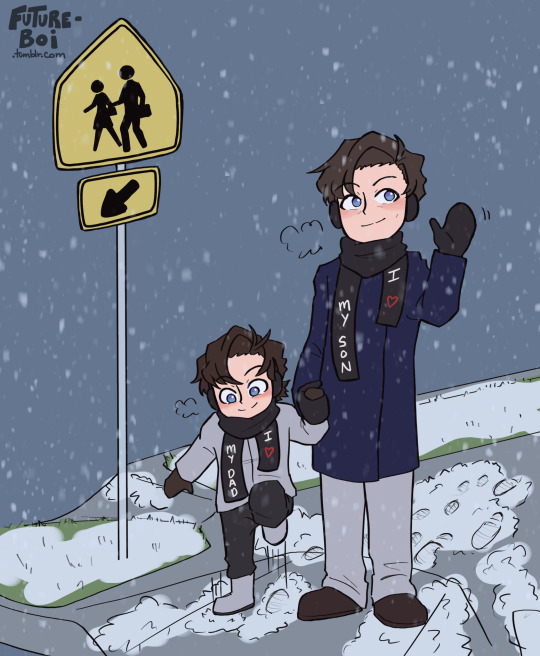
What a cute and adorable dad and son. I sure hope nothing bad happens to the dad, that would really suck 🫢
Nah it’s the Hell Valley Timeline 😱😩😩😭 DUN DUN DUUNNNNN
Ik ik im terrible for this, but there’s this thing im working on that’s related to it and yeah this could be the lone/twin pines too, but i already drew it so…
Tbh I drew this up quickly after seeing scarves like those at the store 🤩😂 inspo strikes at random times
OH SHIT WAIT—
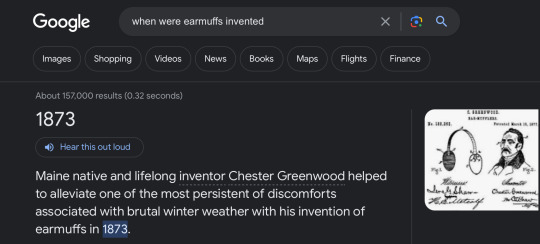
😮💨 aight we good. U can never know🫣
#back to the future#bttf#george mcfly#marty mcfly#baby marty#personal fave#warm fuzzies#but also#hell valley timeline#my art
79 notes
·
View notes
Text
i think the bttf fandom should come up with new timeline names (twin pines, lone pine, hell valley, etc.) for the two timelines in the musical.
firstly because it would make it a little easier to distinguish the musical from the movies, since there are lots of little details that are different, even in the old 1985.
and secondly because the new 1985 marty creates in the musical isn't lone pine. when he crashes into 1955, the car brushes past peabody's twin pines but doesn't knock either down. the barn is condemned, no one lives on the property. we don't see what the mall looks like after he returns to the new 1985, but it's very likely still twin pines.
i have no idea what the names would be, though. probably something else that changed between the timelines. any suggestions?
19 notes
·
View notes
Text
Straight to Hell! The Fictionkin section! Going down!↓↓↓

Welcome to fictionkin hell! The name is obvious!
I’m Mod Vincent/🔪 (He/They/It) and the admin. Our other mods are Mod Phone Guy/☎️ (He/They/It), Mod Springs/🔋(They/It), Mod Cassidy/🦔 (He/They/It), Mod Daniil/🩸(He/Him + Neos), Mod Grover/🫧(She/He + Neos), Mod Trucy/💠(Any Pronouns), and Ghost Mod Columbina/👁(It/Its).
(There’s also Mod Payphone which is just when me and Phone Guy collaborate on a post. Probably gonna just have #mod collab instead for others.)
This blog is was created to give positivity towards the worst kins(though you can do regular kin + fictive requests too)! We all have guilt over our past lives and kinhate doesn’t help. While this blog is anti-kinhate this does NOT mean we support proshitting or anything related, general DNI here!! Learn from the mistakes of your past lives! Don’t repeat them!!
With that out of the way here are the main things we provide in fictionkin hell on the next floor. ↓↓↓

We provide: Kin positivity, canon drawings, icons, wallpapers, general edits, Homestuck edits (PQ edits, talksprites, etc.), mood + stimboards, userboxes, names + neos suggestions, pendulum questions, tarot spreads, shufflemancies, canon/kin calls, timeline questions, music playlists, video playlists, care kits, and fashion kits!
(Sources w/ emojis after them are sources mods would really like to take, also please specify if you would like a video playlist because I’ll just assume you mean music unless specified. Also please put both character and source in your request. Check #extra info for extra questions.)
While we try to do any sources, do note that the main ones we know the best are: (color coded for each mod)
Five Nights At Freddy’s
Homestuck
Stardew Valley ☎️🔪
Sonic
Gorillaz
Danganronpa
DSMP
QSMP
Team Fortress 2 🔪🩸
DHMIS
Silent Hill
Sherlock
Hermitcraft
Undertale
Deltarune
My Little Pony 🔪
Traffic/Life Series
Little Nightmares 👁
Vocaloid 👁
Warrior Cats
Invader Zim
Creepypasta
South Park ☎️
Dialtown
Don’t Starve
RPGmaker Horror Games
The Muppets 🫧
OFF
Genshin Impact 👁
Genloss ☎️
Cuphead
DDLC
The Owl House 🔪
Ghosts BBC
Welcome Home
Inscryption
Emesis Blue 🔪
Slime Rancher
Portal 🔪
Left 4 Dead 🔪
Half-Life 🔪
Backrooms (wikidot) ☎️
Legend of Zelda: Breath of the Wild and Tears of the Kingdom
Legend of Zelda
Hazbin Hotel
Helluva Boss
Hunter x Hunter
The Boys (TV)
Amanda the Adventurer
The Amazing World of Gumball
Lots of Horror Movies
House of Leaves
Arcane
Rain World 👁
Parties are For Losers 👁
Qualia Automata 👁
Pathologic 🩸
Disco Elysium 🩸
Life is Strange
Sesame Street 🫧
Chonny Jash
Baldur's Gate 3 👁
Scott Pilgrim
Epithet Erased
Needy Streamer Overload 👁
Project Sekai 👁
83 notes
·
View notes
Text
WIP files game
Thank you to @littletaxitt for the tag
Ok so instead of doing all the individual chapters like i usually do, all I'm going to do for this one is the actual wips and a couple of other things because I have the tabs open. Basically they're the wattpad stories that i don't post on wattpad and i know i say this a lot but i want to make it clear that's just where my drafts are please-
Rules: Post the names of all the files in your WIP folder, regardless of how non-descriptive or ridiculous. Let people send you an ask with the title that most intrigues them, & then post a little snippet or tell them something about it! Tag as many people as you have WIPS.
-----
Forget me not drafts
Dahlia drafts
Rosemary drafts
Backstory timeline
Character timelines
Outlines
Backstories
Ghost AU
Worldbuilding hell
Playlist organizer
Canon timeline
Full timeline. Listen when your chapter names are dates you've got to make sure the timelines match
Flower symbolism stuff
Sage AU
Black rose AU
Sunflower AU
Zinnia AU
Iris AU
Red spider lily AU
Asphodel AU
Marigold AU
Lily of the valley AU
Satisfied AU
Time loop AU because I think it'd be very silly
Nothing happens ever AU
Zombie AU because the last of us has me in a fucking chokehold
Fish in a birdcage AU
Villain Leo because I think that'd be neat :)
Rosemary alt ending
Forget me not alt ending
Dahlia alt everything
Jaxon befriends a rat which is at this point an AU
Behind the scene moments to use as little flashbacks
Our word AU (???)
Gladiolus AU concept
-----
Tags if you want
@hrmkingizzy
@toribookworm22
@junypr-camus
@regalserpent
@steh-lar-uh-nuhs
@magicicada-lbwrites
@leisoree
@elizababie
#by ''i have the tabs open'' i mean i finally got a computer that can have more than 3 things open at a time and i'm abusing my power#just counted- there's twenty four open tabs right now#listen. i like putting my little guys in Situations and studying them under a microscope#Mostly i didn't do individual chapters because I didn't want to make a 100 point list#and also i didn't want to find one of the other ones and copy paste it. because i am not writing it all out again#i have been a tag game slacker
37 notes
·
View notes